Looking for a table-top system that emphasizes narrative, cinematics, and gives more agency to players? Fate Core is one such system! Today, I dig into how this system works and discuss what makes it a great platform worth playing with your friends.
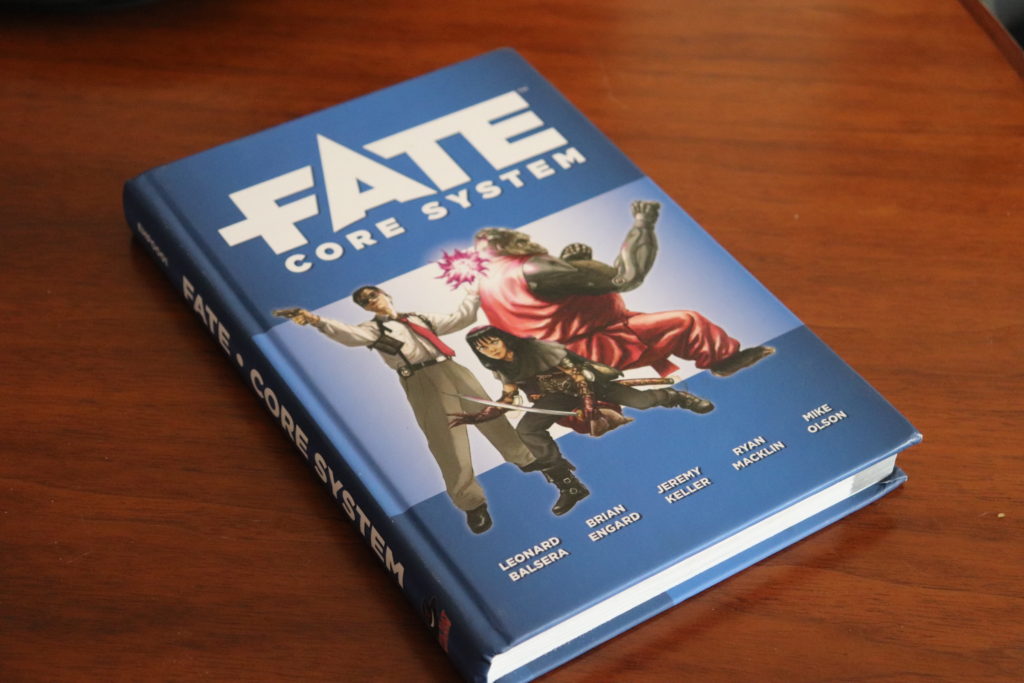
Adventurers clashing sword against sword. Space-faring rebels infiltrating an imperial supply depot. Chosen ones living amongst modern society by day, hunting monsters by night.
Imagination runs wild when sitting around a table with friends, playing a game of roleplay.
Table-top games are everywhere, from the classic Dungeons and Dragons, to Pathfinder, Starfinder, various Star Wars systems, and beyond. However, if there’s something you notice with many of these games, they each sport rigid rule systems which accounts for all sorts of strategic decisions, but can sometimes take bits of imagination out of the game.
I can’t tell you how many times I’ve played Dungeons and Dragons as a player and felt that the rules wouldn’t allow me to do the awesome things I felt like my character should be able to do. Granted, character level and stats factor into that, but the mechanics seems to hamper on the “freedom” to make sweet flips over walls, perform a bunch of epic martial arts maneuvers, and take out the two henchmen without alarming the rest of the compound. Anything like this in Dungeons and Dragons seems to be built to encourage the DM to flex their power and complicate things for the player when they try too hard.
Things are not always going to be cinematic when you’re trying to save the world.
Some systems, however, are better at this than others. Some play with fictional fervor in mind; a process of co-operative storytelling which lets everyone choose the path of the scene.
I want to talk about a system like this; one that I’ve finally gotten to run first hand for my friends, with interesting, but epic results! It’s called “Fate Core“, and its a system that lets the narrative drive the game; not the other way around!
What exactly is Fate Core?
In a nutshell, Fate Core is a table-top game system published by Evil Hat Productions. It enjoyed substantial backing on Kickstarter in 2013, and since then has grown to encompass an number of different source books and settings!
You know the drill: You sit with friends. One is the game master telling the story an controlling the environment. The others play individual characters, overcoming obstacles, monsters, baddies, etc. … However, in this case, theres a twist!
Fate Core allows players to tell a story in a way that is more cinematic than your typical table-top system. Characters in Fate are proactive, competent. and the system gives players free reign to let them perform actions with style!
Like most roleplaying games, the system builds on a series of rolls, skills, and other elements that define the rules of play. However, Fate follows a “fiction over physics” philosophy. When a player takes an action, the narration of the character performing that action comes first.
Instead of having to roll dice through multiple obstacles to perform that action, a single dice roll does the trick. The result determines the degree of success or failure (total fail, success with a cost, casual success, and success with style). From that point, the player and game master both decide what that result looks like.
You can how a system like this favors players coming up with awesome, kickass, or dramatic ways to have their characters approach problems!
Of course, the game master still has control over the setting, but the players have more control over what action sequences look like. Overall, narration is king!
A Glimpse at the Source Book
Evil Hat Productions, the creators of Fate Core, do a fantastic job and breaking down the rules, providing examples, and giving context on both character creation, and how to build the setting the game takes place in.
Throughout the 300+ pages, the rules explain the game in a clean and neat format that is easy to read. Multiple bracketed side-bars break down how those rules come into play, and give example situations where they are best applied. The book sorts each rule into sections that are simple to consume.
Illustrations show various fantastical scenes which are charming to look at, and lends to the home-grown feel of its Kickstarter origins. They offer a comic-book style that lends nicely with various pulp fiction genres
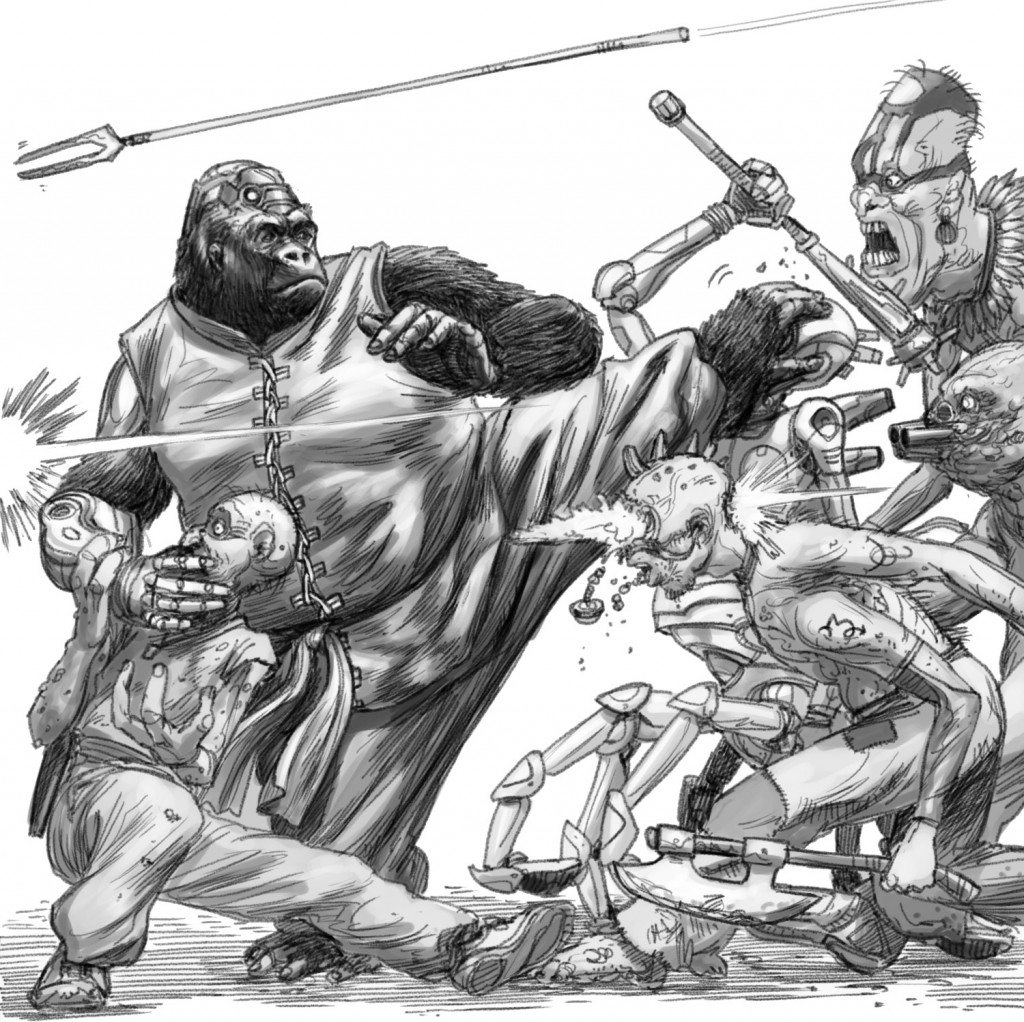

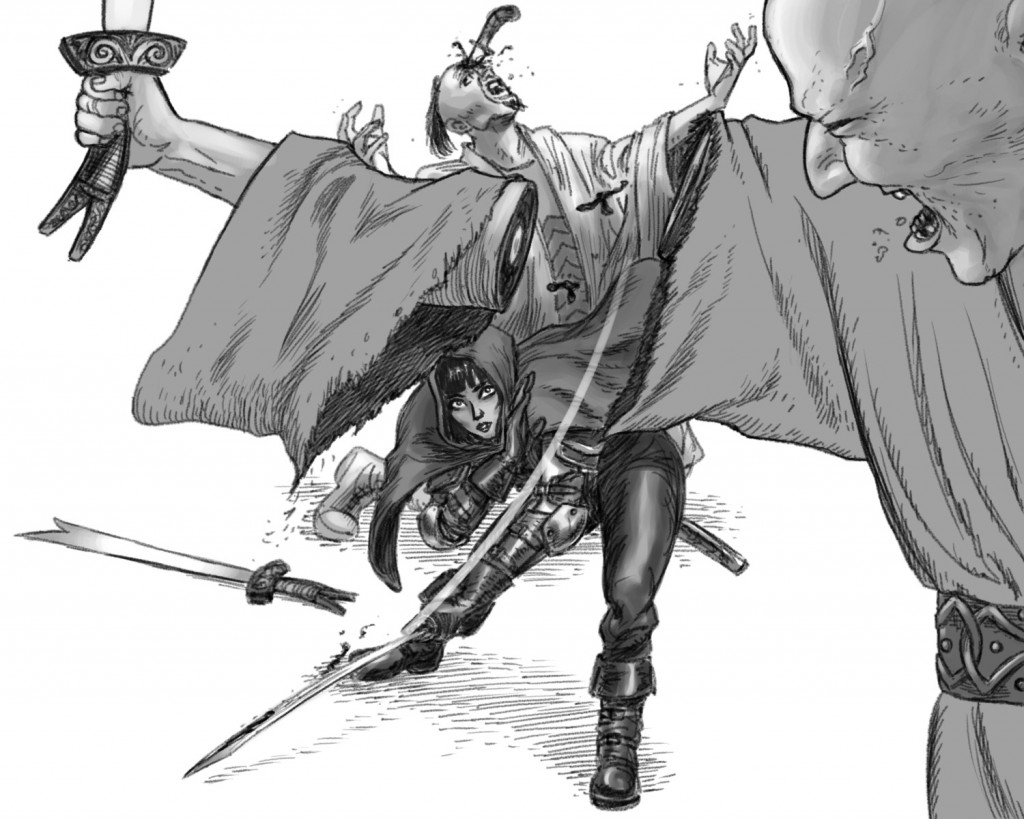
However, one thing you will not find is a setting of any kind. This is by design.
Where games like Dungeons and Dragons, and Shadowrun are all set in a specific genre and world, Fate Core considers itself genre-and-setting-neutral. This means you can literally sit down with your friends and not only hash out your characters, but create an appropriate setting as well. Any genre. Any story. Any world you create. … Its design allows you to piece together the game a way that is appropriate to the story you want to tell!
Game masters have the option to approach it the traditional way of preparing the setting in advance, but the system encourages players to have a say in what this game world looks like.
Also, these materials are freely available for players and GM’s alike! The printed, hard-cover version is available for purchase, but the source book is free for download from Evil Hat, and there is also a website which acts as a live sourcebook that you can visit and read from anywhere.
Breakdown of the Rules of Fate Core
While not encompassing all of the rules, here is a quick breakdown for many of Fate Cores central mechanics.
Base Actions
When it comes to what actions a character can take, Fate provides only four.
- Overcome – To overcome an obstacle
- Create Advantage – To create or unlock an advantage for your character, in the form of an aspect you can use
- Attack – To attack someone in a conflict
- Defend – To defend yourself in a conflict
However, the complexity and flavor occurs in how these actions are applied relative to the scene, and what elements are affecting the environment and the characters results.
Rolling the Dice
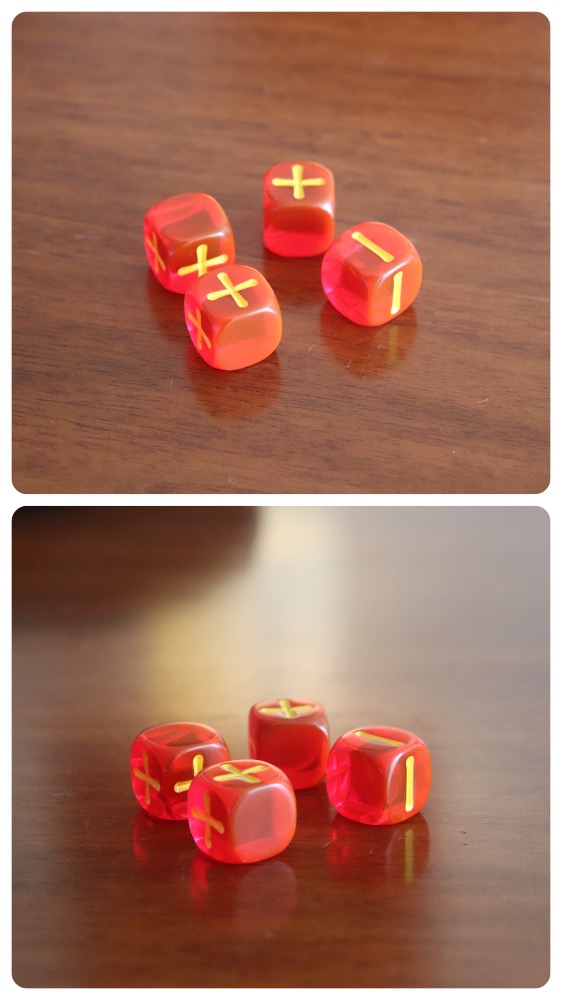
Rolling in Fate goes something like this:
- Fate uses dice (Fudge dice), which are six-sided dice with two (+) sides, two (-) sides, and two blank.
- When taking actions, you roll four dice, counting the (+)’s and subtracting the (-)’s from the result. … 3 +’s and 1 – comes to a total of 2.
- You then add or subtract a value based on what elements are at play in that moment. These can be Skills, Stunts, Aspects, Boosts, and other factors. The final result becomes your roll!
- Rolls are performed against the environment, passive obstables, or active conflicts.
- Successful rolls are determined by a positive shift against the obstacle. a shift of 3 or more is Success with Style, grants higher benefits!
Skills
Skills are self-explanatory for those familiar with table-top games. Performing an action pairs with the kind of skill thats being used to succeed, and that skill provides a bonus to that roll.
In standard Fate Core, characters start with a range of base skills to choose from (18). These skills cover a full range of possibilities, such as Athletics, Crafts, Fight, Investigate, Lore, Rapport, Stealth, Will, etc. …
However, these base skills may or may not be best for your specific setting. You might not do tons of Drive skill rolls on a shipwrecked island, or might want to add a skill for Computers or Electronics if playing a cyberpunk setting. This is one area where Fate truly shines!
Fate has default skills, but is also a toolkit that allows you to build your own table-top game by adding or changing the mechanics to fit the kind of game you want to play. This includes adding or sub out any number of skills with ones from a published Fate driven setting, or ones you created yourself!
Aspects
Aspects are the main mechanic in Fate. Each aspect is a short sentence or phrase which represents a quality or trait. That trait can specific to a character, NPC, setting, monster, situation, object, or … anything really.
These short phrases (“Nothing Personal, It’s Just Business“, or “She’s the Fastest Ship in the Sector“) can be invoked in a specific situation to either drive a characters interaction with their environment, provide an advantage or disadvantage to an event they’re involved in, or to emphasize the danger or stakes of a particular scene.
You may decide that your character has the following five aspects;
- Name: Fiona Cunningham
- High Concept: Enchantment Specialist of Hippogriff House
- Trouble: Cast Now, Ask Questions Later
- I Hate Those Guys in Cyclops House
- Sarah Has My Back
- Dexter Fitzwilliam Is Going Down
You might decide that Castle Hemsworth, or specific rooms of the castle, has the following aspects:
- Castle Hemsworth – Overall
- A Great and Terrible Evil Lives Here
- Scattered Old Bones and Uneven Footing
- Blizzard Raging Outside
- Castle Hemsworth – The Private Library
- Eldrich Runes Line the Walls
- Secret passages?
Perhaps a monster rising from the bottomless well in the basement has these for aspects:
- The Creature
- Ten Spiney Legs
- Hungry for Flesh
- Don’t Look Into Its Eyes!
- That Horrible Stench!
This is where physics and fiction intersect for Fate, as these not only sum up the situation, but are there for characters to either leverage with skills, or try to avoid. And of course, the game master will have all sorts of ways to leverage these against the players.
Stunts
Anyone can perform any skill on the list; but only one person can perform their stunt.
Stunts are what I like to refer to as “speciality skills”. They’re not skills, but they are things that a character can do with a specific skill that others cannot. Think of it as a specialization. Training. Area of study. Talent. … Its based on a specific skill of the characters choosing, but it changes how they can use that skill in specific situations, most often in the form on an enhancement.
- If you have a decent Athletics skill, then perhaps you also could have a stunt (“Sprinter“) that allows you to run twice the distance as usual for a limited time.
- If you’ve put points in the Lore skill, then perhaps your area of study is “Egyptian Archaeology“, which gives you a bonus to any Lore roll that involves studying ruins, and interpreting hieroglyphics.
- If you’re keen in Stealth, then maybe you are “Lightfooted“, which makes Notice rolls against you that are reliant on hearing more difficult, and makes your presence less known on an old creaky catwalk.
Fate Points
Fate Points are a currency that grants players the ability to give them an edge on the game. Characters begin with a pool of Fate Points, which can be spent to allow characters to Invoke an Aspect, Power a Stunt, Refuse a Compel, or Declare a Story Detail.
Fate Points are replenished by a characters “refresh” with each game session, and points are also acquired through Accepting a Compel, Have Your Aspects Invoked Against You, and Conceding in a Conflict.
Other Rules and Concepts
Obviously, I haven’t covered everything here, but you can check out the Fate Roleplaying Game SRD for more information!
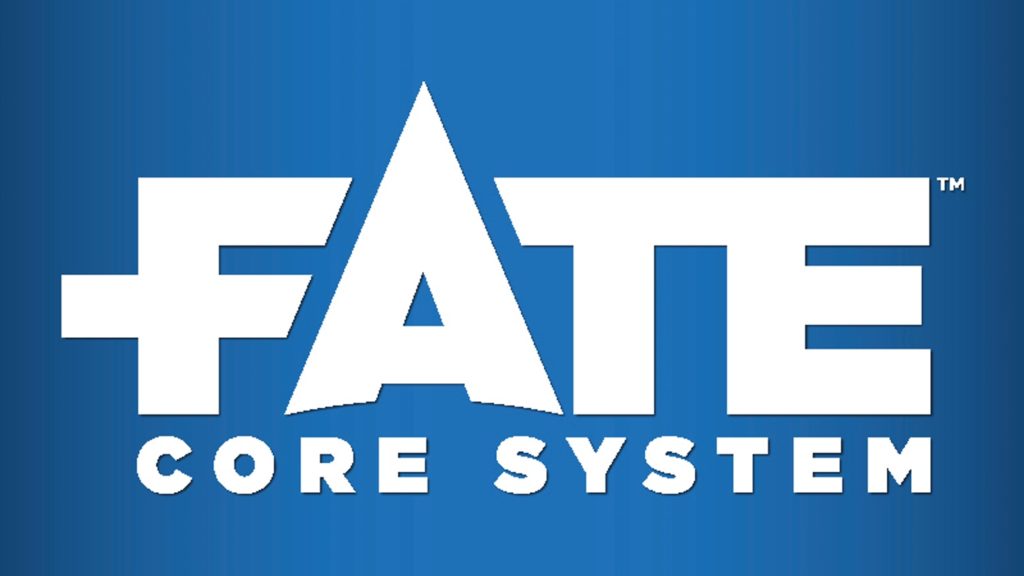
Putting it all together!
Through my research, I decided to give the system a go! For months, I wanted to introduce Fate Core to my friends, but waited on the prime opportunity to establish a setting they’d all be into.
My First Game Running Fate Core
We settled on the best option imaginable: a Jurassic Park-based RP!
If you want to know a more in-depth synopsis about the session, how it went, and what my thoughts were about first-time play, I’ll be posting a follow-up article, and updating this one with a link here!
In the meantime, let me give you an overall synopsis of my experience, and what I and my friends think about Fate Core as a system.
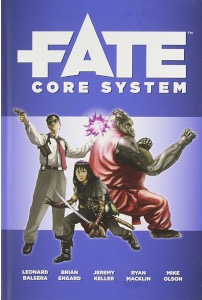
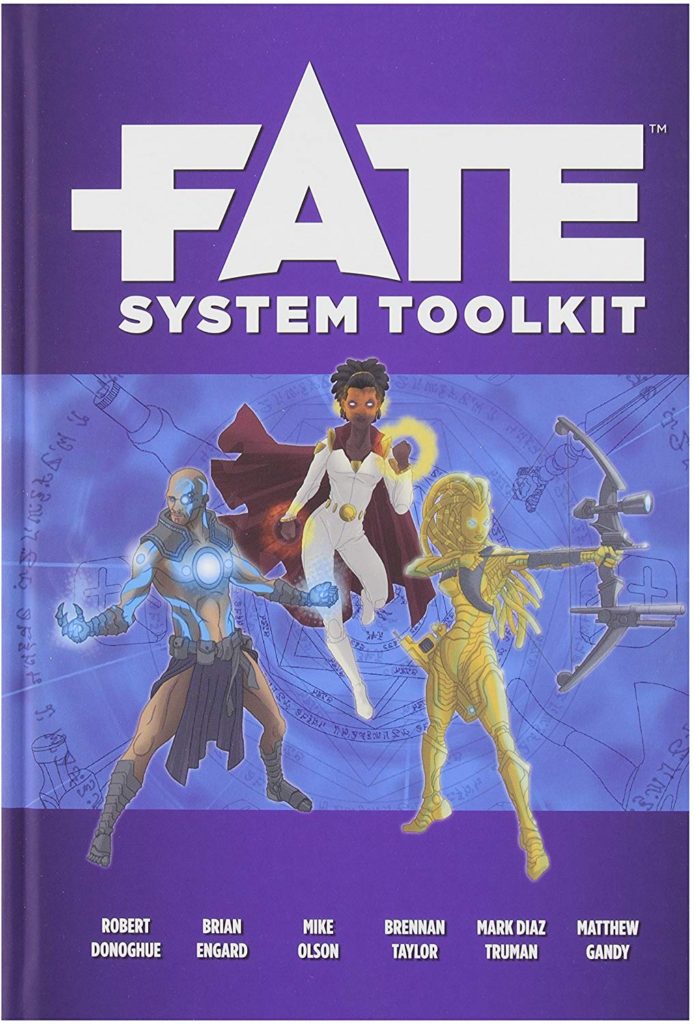
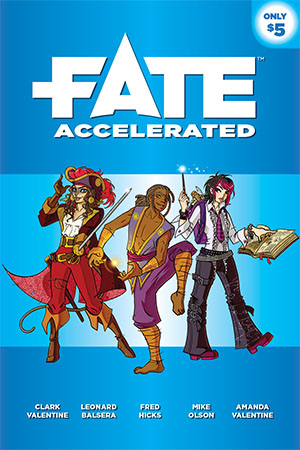
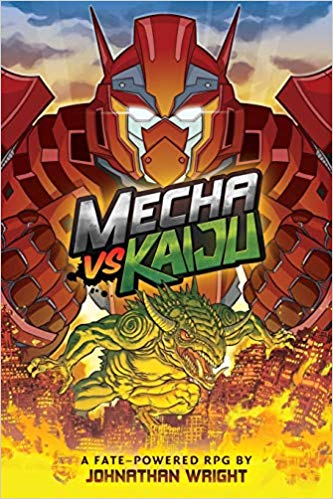
The Pros and Cons of this System
PRO: Simple, but Expandable!
Fate is a system built for simplicity, imagination, and for expansion! Applying mechanics from multiple source books, various settings, and even you own home-brewed rules can make the game into anything you want, and perfect for your setting!
PRO: The Source Books Are Fantastic!
I can’t stress how amazing these books are when it comes to delivering the game in a clean and easy to read format! Paired with appealing illustrations, and knowledgable side-bars, I’d recommend them to anyone!
PRO: Player Agency Abound
Game masters do not have all of the power. From setting creation, to character creation, to gameplay, players have significant say in the style and progress of the game, not bound by rigid mechanics that hamper on narrative.
PRO / CON: Proactive Players with Some Story Improv Skills Required
This is only really a “CON” if you are looking for something to lay back and not engage too heavily on. While the rules are simple to understand, its not a “casual” game. Also, if you’re not super keen on creativity or story-building, its likely not your perfect system.
CON: Low Number Crunch. Not for Wargaming, Tactics, or Math Wiz's.
Fate has mechanics, but they are sub-classed by narrative. Tactics with high amount of number crunch and statistics aren’t part of Fate Core. While you can build up the system with add-ons to the mechanics, the more you do, the further away the game treads from what Fate is good at, which is narrative gameplay.
CON: Character Advancement and Leveling Might Need Some Tweaks
If you enjoy table-top games for “munchkining” shiny stuff and building your character with better stats, Fate Core does have some advancement options, but not in the way that a hard-numbered RPG would.
Final Takeaway
Fate is great for table-top gamers and newcomers who enjoy a bit more pulp adventure in their tales. The baseline does not require an elaborate know-how of the mechanics, but the game benefits from being crafted into something new by adding the kind of mechanics that best suit the setting.
Fate is best kept to an aspect-based, cinematic kind of play, and while you can cook it into any recipe you want, it’s not built for war-gaming, games with highly-elaborate character or equipment build-outs. and the like.
With that said, if you want to add some crunch, you certainly can! I recommend resources like Fate Accelerated, and many other resources Evil Hat and the community at large has published.
For veteran RPG players, its certainly something I recommend, if not simply to provide them a different look into what table-top games can be. It does require a change of mindset, which is honestly a good thing!
For game masters, a great resource I recommend reading to get properly adjusted to this system is The Book of Hanz.
It’s only been six years since its inception, but I can tell that systems like Fate Core have a bright and shining future ahead of them.
Want to check out Fate Core for yourself? … Click on the links below!
- Fate Core website
- Purchase the core rulebook, or download a free PDF!
- Evil Hat Productions
- Fate Roleplaying Game SRD
- The Book of Hanz
- Axolotls, Genies, and Kaiju; a Quick TTRPG Zine Roundup #2 - May 19, 2025
- d100 City Encounters and Urban Sidequests - April 26, 2025
- Dirtbags! a Sci-Fi Shooter RPG: Gameplay Review! - March 23, 2025


